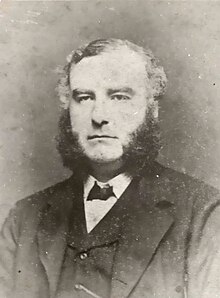Alfred Newton
English zoologist and ornithologist (1829-1907)
Alfred Newton (11 June 1829 – 7 June 1907) was an English ornithologist and Professor of Comparative Anatomy at the University of Cambridge.

| This scientist article is a stub. You can help out with Wikiquote by expanding it! |
Quotes
edit- To attempt the taking of an Ornithological Census of these islands was a favourite idea of Mr. John Wolley's; so much so, indeed, that I believe he used to regard its accomplishment as the chief requirement of British ornithology. ... Two of the expressions which have lately become very familiar to the ears of naturalists are the "Struggle for Life," and "Preservation of Favoured Races" therein. Each of these points, as it seems to me, would be greatly elucidated by the carrying-out of Mr. Wolley's idea."
- (1861). "On the Possibility of taking an Ornithological Census". Ibis 3 (2): 190-196. (quote from pages 190–192)
- Here is a zoological anecdote. Mr. G. X. is very ugly and hairy. He went to call at a house a few days ago and found only a little girl in the drawing-room. He began to say something civil to her but she would not answer. At last he said, "You don't know who I am!" "Yes, I do," she replied, "I gave you a bun at the Zoological Gardens last Sunday—and, you naughty man, you had no clothes on!"
- July 6, 1878 in a postscript to a letter written to Mrs. Hugh Strickland, as quoted by A. F. R. Wollaston in Life of Alfred Newton. London: John Murray. 1921. p. 237.
- One species, L. excubitor, derives it trivial designation from the use made of it as a sentinel by falconers when catching wild Hawks. The mode employed is well described by Hoy (Mag. Nat. Hist. iv. p. 342), but it can only be briefly described here. The Hawk-catcher lies hidden in a hut, watching through a small hole the Butcher-bird which is tethered some yards off, and by its actions not only gives him notice of the approach of a Bird-of-Prey, but also indicates of what kind the stranger is. Thus the sentinel is but slightly troubled at a passing Kite, Eagle, or Buzzard; but beats itself on its perch with screams at the sight of a Harrier, while on the appearance of a Falcon or Sparrow-Hawk it drops with cries of distress into a retreat that has been been considerately prepared for it. On this the falconer, by pulling long strings, displays first one and then a second tethered Pigeon, and the instant the Hawk clutches this last, draws a bow-net over both, thus securing his prize.
- "Butcher-bird". A Dictionary of Birds. vol. 1. London: Adam and Charles Black. 1893. p. 66.
Quotes about Alfred Newton
edit- Certainly humans can be destructive and shortsighted; they can also be forward-thinking and altruistic. Time and time again, people have demonstrated that they care about what Rachel Carson called "the problem of sharing our earth with other creatures," and that they're willing to make sacrifices on those creatures' behalf. Alfred Newton described the slaughter that was occurring along the British coast; the result was the Act for the Preservation of Sea Birds...
- Elizabeth Kolbert The Sixth Extinction: An Unnatural History (2015)
- Newton's conversatism is evident in everything connected with his life—his views upon most subjects, his personal habits, attire, etc., but curiously enough we find him among the first to adopt the ideas of Darwin and Wallace on evolution and one of their staunch supporters in the stormy discussions which rent the British Association in the early sixties.
- Stone, Witmer (1921). "Wollaston's 'Life of Alfred Newton'". The Auk 38 (4): 612–614. (quote on p. 613)
- Newton's Dictionary of Birds, published in four parts by Adam & Charles Black, London, between 1893 and 1896, and as a single bulky volume in 1896 was his magnum opus (Dawson 2008), a monumental work that inspired awe and admiration from all reviewers. ... Newton's main achievements are threefold: (1) helping to initiate the British Ornithologists’ Union and its journal The Ibis, (2) promoting the conservation of birds and (3) his Dictionary of Birds.
- Birkhead, Tim R.; Gallivan, Peter T. (2012). "Alfred Newton's contribution to ornithology: A conservative quest for facts rather than grand theories". Ibis 154 (4): 887–905. DOI:10.1111/j.1474-919X.2012.01274.x.